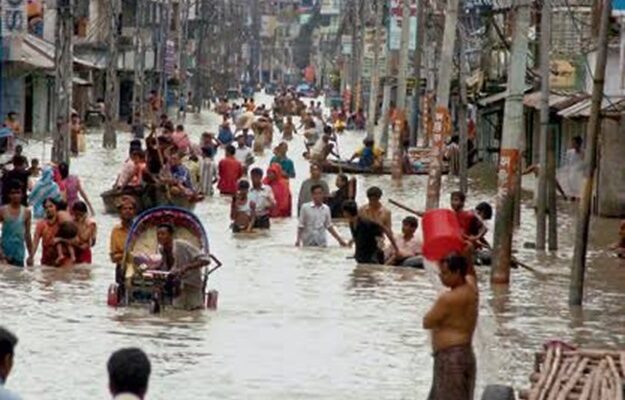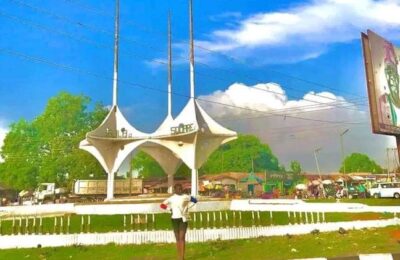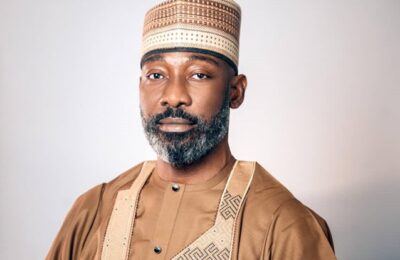By Muhammed Sherifdeen Omeiza.
“We are the first generation to feel the effect of climate change and the last generation who can do something about it.” — Barack Obama”
When disaster strikes, it tests not only the resilience of communities but the readiness of humanitarian systems. I remember seeing videos of fathers carrying children on their shoulders through waist-deep water, and mothers sitting on rooftops waiting for rescue boats that never came. These people didn’t flee from war or persecution; they fled from the weather, from a climate that no longer recognizes its own people.
In 2025, the frequency and severity of climate-induced disasters have escalated globally. According to the UN’s World Meteorological Organization, over 150 unprecedented climate disasters occurred worldwide, making it the hottest year on record. These extreme events, including heatwaves, floods, and storms, displaced more than 800,000 people and resulted in significant crop losses. Notably, severe floods in Senegal, Pakistan, and Brazil, and supercharged storms like Hurricane Helene in Florida and Super Typhoon Yagi in Vietnam, underscored the urgent need for comprehensive climate adaptation strategies.
In Nigeria, the situation is equally dire. In May 2025, catastrophic flooding in Mokwa, Niger State, resulted in at least 151 deaths and displaced over 3,000 residents. The flood, which lasted approximately five hours, submerged homes and infrastructure, affecting at least 500 households across three communities. Roads and bridges were destroyed, complicating rescue and recovery efforts. Emergency services continue to search for victims, especially in remote areas, while injured survivors receive medical care. This event follows a similar tragedy in Adamawa State, where flash floods displaced over 5,500 residents across five communities.
These incidents highlight a broader trend: climate-induced displacement is becoming a significant driver of humanitarian crises. The 2025 Global Report on Internal Displacement (GRID) indicates that disasters displaced 9.8 million people globally, the highest figure on record. In Nigeria, over 2 million people remain internally displaced due to ongoing insecurity and climate related disasters, with severe funding cuts in 2025 sharply impacting humanitarian response efforts.
The human cost is staggering. Families lose their homes, their livelihoods, and often their lives. Children are deprived of education, and communities are torn apart. Yet, the international legal framework remains inadequate. Climate-induced displacement is not recognized under the 1951 Refugee Convention, leaving millions without legal protection or support. As noted by the European Parliament, “There is no clear definition of a ‘climate refugee’, nor are climate refugees covered by the 1951 Refugee Convention”
To address this crisis, we must first acknowledge that climate-induced displacement is a humanitarian issue, not just an environmental one. Governments must strengthen disaster preparedness and response mechanisms, ensuring they are inclusive and equitable. International bodies should recognize climate-induced displacement in legal frameworks, providing displaced individuals with the protection they deserve. Funding for adaptation and resilience building initiatives must be increased, with a focus on the most vulnerable regions.
Moreover, we must invest in long-term solutions. This includes supporting communities to adapt to changing climates, promoting sustainable livelihoods, and enhancing local governance structures to manage displacement effectively. Collaboration between governments, international organizations, and local communities is essential to create a comprehensive and sustainable response.
The stories of those displaced by climate change are not just statistics; they are a call to action. As the climate crisis intensifies, so too will the displacement. If we fail to act now, we risk not only the loss of homes and livelihoods but the erosion of our shared humanity. The time to act is now before the crisis becomes irreversible.
About the Author
– Muhammed Sherifdeen Omeiza is a Nigerian researcher and writer whose work explores the intersection of humanitarian action, human rights, and global governance. With a keen interest in public policy, democracy, and political economy, he examines how local experiences and global decisions shape humanitarian outcomes in times of crisis. His writings draw from African and international contexts, reflecting a commitment to justice, accountability, and people-centered governance in global affairs.
Phone number: 08160364451,
Email: sherifdeenmuhammed001@gmail.com




